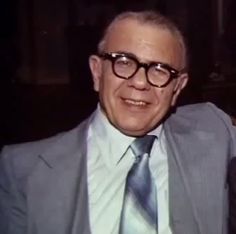Mafia Kingpin Angelo Bruno died a particularly violent death in Philadelphia, an act that sparked a violent mob war that raged on throughout the 1980s. However, for over two decades, Bruno was nicknamed “the Gentle Don,” and was better known as the mob kingpin who brought order, organization, and relative peace to the restive Philadelphia organized crime network. While he is gone now, and the Philadelphia Mob is a shadow of its former self, Angelo Bruno left a mark on Philadelphia that endures to this day.
The Early Days
Born Angelo Annaloro in Sicily in the early 1900s, Angelo Bruno emigrated to the United States with his family at a young age, settling in south Philadelphia. He had the humble, hardworking beginnings that were common to the tens of millions of other European immigrants who arrived in the early 1900s. Bruno’s father established a grocery store, and young Angelo worked there tirelessly, often to the detriment of his education.
Later on, Angelo married his childhood sweetheart, Sue Maranca, and remained married to her for the rest of his life. As an adult, Bruno lived in a modest rowhouse in South Philadelphia, raised his two children, and owned several legitimate businesses. However, despite the respectable veneer, Bruno was also a career criminal who established lifelong ties to the Mafia at an early age.
Bruno became a part of the restive Philadelphia mob scene as a young man. He assumed the surname Bruno in part as a homage to Philadelphia gangster Giuseppe “Joe Bruno” Dovi. The local Mob kingpins of the time respected Bruno, and the competent young man became increasingly involved in criminal activities. The Philadelphia mob was renowned for constant infighting, often leading to bloody wars in the streets as rival factions fought for control of the rackets there. Bruno approach organized crime more like the legitimate businesses he ran; uncontrolled violence in the streets, in his eyes, was bad for the Mob’s bottom line. His close ties to the Five Families in New York city – who often attempted to control violence through meetings and mediation – likely informed Bruno’s thinking on this as well.
In 1959, after a long power vacuum in Philadelphia due to Dovi’s death and the arrest of other high-ranking mobsters, Angelo Bruno became the leader of the Philadelphia Mafia.
The Era of the Docile Don
Having lived through years of tumult and chaotic gang violence in the streets, Bruno decided to take an entirely different approach to organized crime. He ran the rackets in Philadelphia and southern New Jersey like one of his legitimate businesses. During the two decades under Bruno’s reign, violence was out, and profit was in.
Bruno was not averse to using violence when it was necessary, however; he ran the Philadelphia Mob after all, not a charity organization. However, where his predecessors were more willing to result to violence to solve problems, Bruno chose to use cunning instead. The shrewd gangster established ties to politicians and powerbrokers across his territory, often doing so by issuing bribes and doing favors. Lowering the violence proved to be lucrative to his crime network. The Philadelphia rackets, freed from the chaos and violence of the recent past, were more lucrative than ever. Bruno’s organization also made tremendous profits from the gambling industry in Atlantic City as well.
In the Mafia however, good things often come to a bloody, violent end, and that end began with Bruno’s expansion into and control of Atlantic City’s gambling rackets.
The Bloody End of Angelo Bruno.
Atlantic City, where gambling had recently been legalized, was considered fertile ground for organized crime. The Five Families recognized Atlantic City as Bruno’s territory, but nonetheless many Gangster’s chafed at what they perceived as his heavy-handed management of it. Additionally, Angelo Bruno faced considerable dissension within his own ranks over his policy on narcotics. Along the Eastern seaboard, many gangsters were amassing a fortune dealing in illegal drugs. However, Bruno disliked the narcotics racket, and strictly limited the drug trade in Philadelphia. Many Mafiosos privately seethed over this order.

Eventually, Angelo Bruno succumbed to the gang violence he had tamped down so successfully as the Godfather of Philadelphia. On March 12, 1980, Bruno was assassinated with a shotgun blast to the head while sitting in a car outside his South Philly rowhouse. His death set in motion a violent gang war that that pitted different factions of the Philadelphia Mob against one another and left several top gangsters dead in the streets; one of them, Phillip “the Chicken Man” Testa, was even blown up with a nail bomb on his front porch. Singer Bruce Springsteen memorialized the violence and upheaval of this period in his 1982 song “Atlantic City.”
An Infamous Legacy
The Philadelphia Mob declined considerably after Bruno’s death, done in by a combination

of increased law enforcement scrutiny and its own violent infighting. However, even today, there is still an organized crime presence in the City of Brotherly Love; there are also indications that the Mob there is making a comeback. If it is, it is doing so upon a corrupt foundation laid by Angelo Bruno.
Despite all of the crime and violence that Bruno unleashed upon Philadelphia, there are still some in the city that view the Docile Don with a bit of warmth and nostalgia. Recently, there was even a campaign to place his home on a register of historic places. However, the Philadelphia Historical Commission ultimately declined to do so, noting that while Bruno may have been “notorious and infamous, that does not make him a person of significance.” Instead, Bruno’s legacy may be the organized crime that continues to vex Philadelphia, along with the significant law enforcement efforts that strive to contain it.
